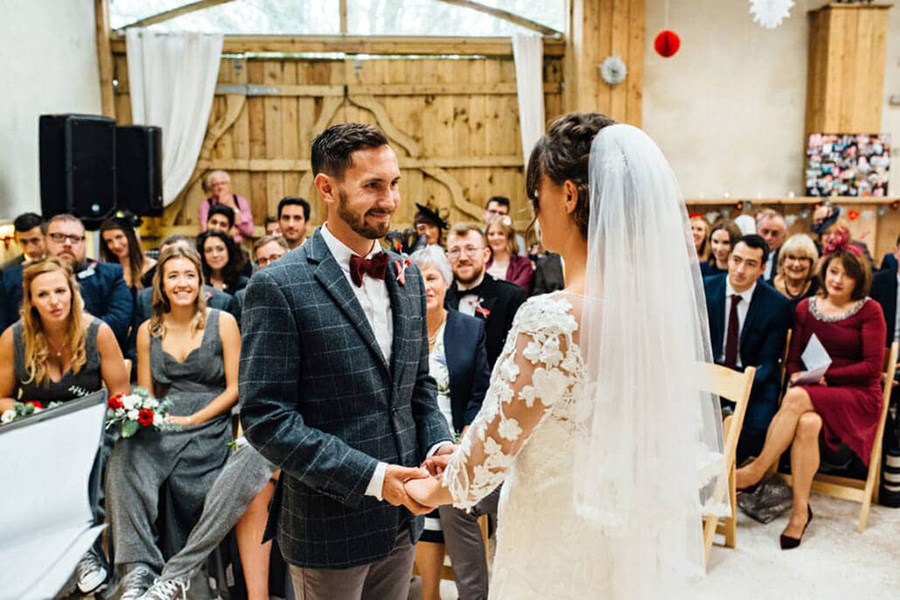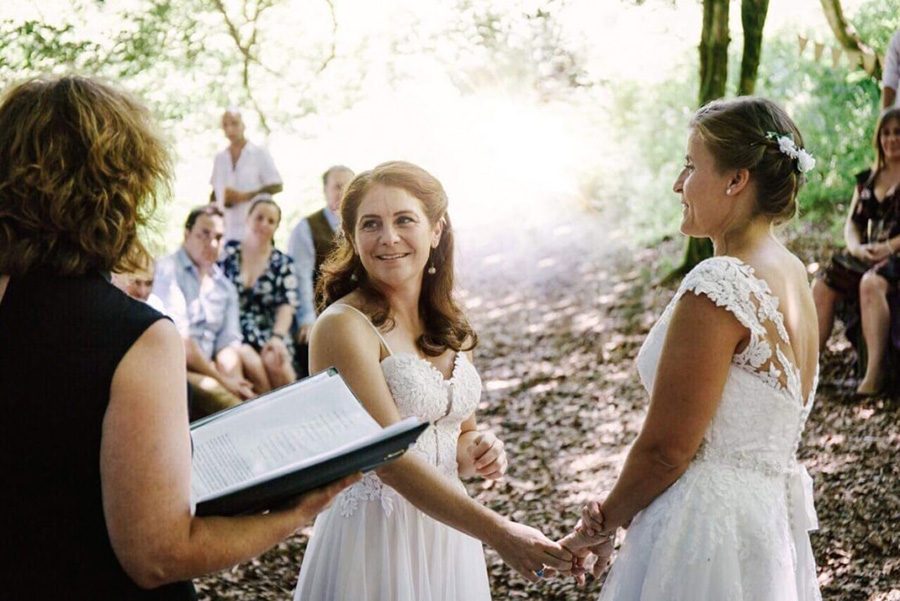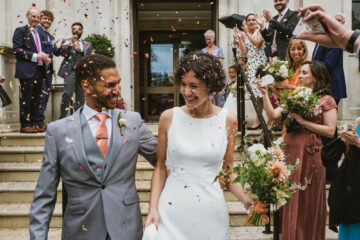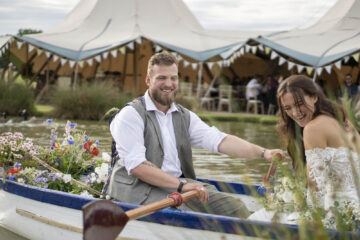Why millennial couples wanting a traditional wedding ceremony are turning to Wedding Celebrants

A guest article by Fanfare Ceremonies / Header image by Little Phat Dog Photographic
Millennials are wanting their wedding ceremonies to be unique, customised and fun but equally do not want to veer too far off the traditional format of the day.
So let’s drill down the reasons why celebrant led ceremonies are so attractive to forward thinking couples.
Celebrant led Ceremonies
Wedding celebrants are trained to provide you with a tailor made ceremony designed to celebrate your union in a way which is meaningful and appropriate to you and your choices for your wedding and way of life.
They ideally spend months getting to know you, building a trust and friendship before your day before designing and creating a ceremony which is completely bespoke to you.
This not only means that the script will be packed full to the brim with personal anecdotes, laughter and sentimental touches, but also the ceremony will feel like it is being led by an old friend.
All celebrants have their own style. And there are celebrants who specialise in the more traditional service. Combining tradition with personalisation and in a relaxed and informal atmosphere.
No rules or regulations
Celebrant led ceremonies have no restrictions at all by religion or law. This means your ceremony can include absolutely anything you want. So if you want aspects of the traditional church wedding this can be included. Be it a prayer, small act of worship or maybe just a hymn.
A celebrant led ceremony can bridge the gap perfectly and in so doing can satisfy shall we say the more traditional guests more used to a conventional church wedding or any other potential doubter.

Photo credit Vaughan Stephens Photography
Symbolic rituals
Another advantage of a celebrant led ceremony is personalising it by incorporating a cultural or symbolic ritual such as hand fasting or unity candle ceremonies. Although not for everyone these ceremonies can be tailored to suit and are a lovely way of including family members and/or friends.
No over used templates
You can choose to write your own vows, use the familiar generic ones or mix some of the well known with something you have written yourself. You can keep your vows secret from one another which certainly adds something special for you both personally. You can read them yourselves, memorise or the more familiar repeat.
It’s the same with the ring exchange. The generic familiar wording can be used or it can be tailored to suit you. It’s completely up to you!
Have your wedding ceremony at home
Being unrestricted by law, a celebrant can officiate your ceremony literally anywhere – indoors or outdoors – and in any venue – public or private – licensed or unlicensed and anywhere in the world.
If it’s possible is there really anywhere better than at home in your parent’s garden?
So what’s the drawback?
This all sounds completely ideal doesn’t it? Unfortunately there is a small down side. Some couples feel this is more of a downer than others but if you are of the persuasion that the personalisation of your ceremony is the most important then the next few sentences will matter little.
A celebrant cannot legally marry you. For it to be recognised by law you must fulfil the legal formalities at the local registry office either before or after your wedding day.
My ceremony won’t be real
Is it real then I hear you ask? All celebrants [and at least one wedding blogger!] will argue ‘of course it is’. A celebrant ceremony is the most personal way to commit to one another and in most cases guests don’t realise or aren’t in the least bit interested. They are far too absorbed and enjoying the moment.
Celebrants are passionate about their job. They are lovers of people, good listeners and have enormous empathy. They are story tellers and are fun and engaging. A great celebrant will afford you the luxury of being able to relax and enjoy your ceremony.
Church wedding ceremonies
Church wedding ceremonies integrate much-loved traditions in a religious context that many feel underpin the constitution of marriage. There is no doubting the beauty and atmosphere of a church wedding.
However, rules do apply. You will be required to include at least one bible reading in your service, and to adhere to the parish rules for church attendance in the lead up to your day – so if religious value really isn’t your thing this may not be the ideal choice.
Your marriage will be made legal on the day of your wedding. The vicar acts as Registrar and you sign the legal marriage register. Unfortunately same sex marriages are still not currently allowed to take place within the Church of England.
Church wedding ceremonies are formal by their very nature. They have a legal form of words that have to be adhered to and you cannot write your own vows. The vicar will spend time with you before your wedding and will guide you through the procedure. However you are reliant on the flexibility of your vicar to permit any personal adaptions. Some are more receptive than others.
Civil wedding ceremonies
One of the reasons for the decline in popularity of church weddings is because of the surge in popularity of civil wedding ceremonies at licensed wedding venues.
In England and Wales for a wedding to be legally recognised the ceremony needs to be conducted in a licensed and registered venue by a registered registrar.
There are some really beautiful licensed venues out there. Owners of glorious historic country house, manor houses and even castles have turned to the wedding industry to raise funds to quite literally keep the roofs over their heads.
However, registrar-led ceremonies allowed at these beautiful venues are quite restrictive in their content. Due to government law, the registrar cannot include any element of religion, cultural tradition, or spiritual symbolism – so you cannot include hymns, religious readings or prayers, or anything recognised as being a symbolic ceremony such as a Hand Fasting.
Timings are also under restriction as often the registrar will only allow up to 30 minutes for your ceremony, due to further bookings to attend on the same day. You are unlikely to have met the Registrar before and any changes to the “one ceremony fits all” template need to be approved at least a week before the wedding date.
Registrars are becoming a little more flexible about personalising your vows and ring exchange but the words surrounding this are pre-selected and are the same used for each and every couple.
To conclude
With a celebrant led ceremony everything is possible. There are many trends being banded about on what millennials want from their weddings but the consistent trend is personalisation.
No wedding ceremony is more personalised than that led by a wedding celebrant. The key is to choose a wedding celebrant who aligns with the style of ceremony you are dreaming of.
If you are looking for a wedding celebrant that presents traditional ceremonies with a contemporary twist contact Fan at www.fanfareceremonies.co.uk



0 Comments